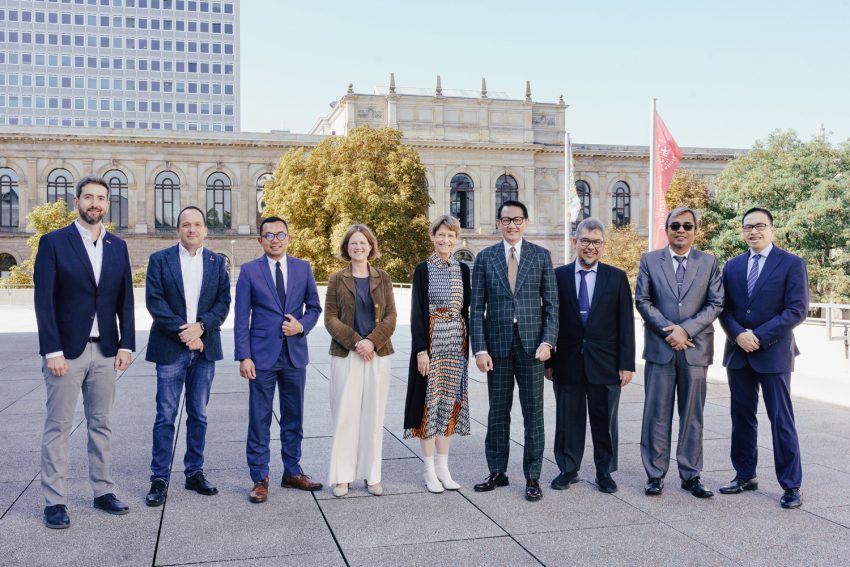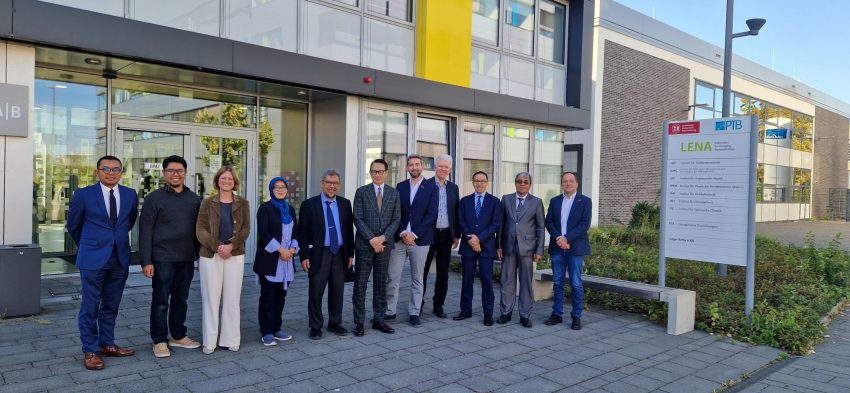Indonesian delegation visits TU Braunschweig Discussions on cooperation in semiconductor research
A six-member delegation led by the Indonesian Ambassador H.E. Arif Havas Oegroseno visited Technische Universität Braunschweig on 20 September. The purpose of the visit was to discuss opportunities for cooperation with TU Braunschweig in research, teaching and training – with a particular interest in the field of semiconductor technology.

President Angela Ittel (5th from right) welcomed the Indonesian delegation at TU Braunschweig. Photo credits: TU Braunschweig
The first stop of the delegation’s visit was a meeting with TU President Angela Ittel, Professors Daniel Prades and Tobias Voss from the Institute of Semiconductor Technology, and Margarethe Schuseil, Deputy Director of the International House. In addition to getting to know each other and discussing possibilities for cooperation in the field of semiconductor technology, the meeting also focused on study visits by Indonesian students to TU Braunschweig. “TU Braunschweig is perceived internationally as an important cooperation partner; the research conducted here has an excellent reputation and international impact,” said President Ittel.
The delegation then visited the Laboratory of Emerging Nanotechnologies Research Centre (LENA) together with Professors Prades and Voss. During the tour, the guests were given an insight into current research projects at TU Braunschweig by Dr Thorben Dammeyer, Managing Director of LENA, and Professor Meinhard Schilling, Head of the Institute of Electrical Measurement and Fundamentals of Electrical Engineering. In addition, junior research group leader Dr Rany Miranti-Augustin and PostDoc Agus Budi Dharmawan, both from Indonesia and working as researchers at TU Braunschweig, shared their experiences.

Group photo after the tour of the Laboratory for Emerging Nanometrology, or LENA for short. Photo credits: Thorben Dammeyer/TU Braunschweig
Current research topics, the Cluster of Excellence ‘Quantum Frontiers’, subject-related study opportunities at TU Braunschweig and cooperation partners in the Braunschweig research region were presented. The guests were impressed by LENA’s unique research infrastructure and showed particular interest in English-language Master’s programmes such as the Master’s programme ‘Quantum Technologies in Electrical and Computer Engineering’. Another promising starting point is the establishment of a new English-language Master’s programme in microelectronics at the Faculty of Electrical Engineering, Information Technology and Physics in 2025.
In a final round of discussions, the next steps in establishing a possible collaboration were discussed and will be further specified in the coming weeks.
New semiconductor strategy of the Indonesian government
The reason for the visit is the Indonesian government’s strategy, led by the Indonesian Ministry of Industry, to develop a domestic silicon industry with the aim of producing silicon wafers – the basic components for microchips – itself in the future. An extensive scholarship programme has already been set up to enable Indonesian students to acquire the necessary skills in semiconductor technology abroad.
